Biden Inauguration Signals Return of Presidential Support of the Arts
Saturday In The Arts offers an in-depth look at a local person, trend or event of interest in the Quad-Cities. It runs weekly on your free local media for arts and entertainment, QuadCities.com.
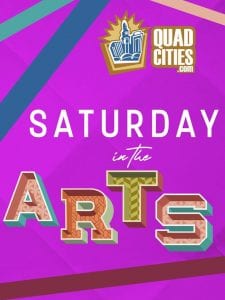 What a difference a president makes.
What a difference a president makes.
Beyond the relief of seeing President Joe Biden – the polar opposite of Donald Trump in nearly every conceivable way – be sworn in Jan. 20 as our 46th president, the glorious inauguration ceremony and related events before and after got me thinking about the role of the arts on a national level.
Music, art, theater, dance, poetry and other art forms truly serve and embody the theme of the inaugural and new administration – unity, healing, and togetherness. And like his former boss (President Barack Obama), Biden put arts and culture front and center, to cut to the heart of the matter, express our hopes and dreams, comfort us during grief, and appeal to our better angels.
With inspiring decency, kindness and selflessness (again opposite of Trump), Biden in his inaugural address exhorted all Americans to work as one to address unprecedented challenges we face all at once.
“We will press forward with speed and urgency, for we have much to do in this winter of peril and possibility,” the oldest president to take office (78) said. “Much to repair. Much to restore. Much to heal. Much to build. And much to gain.”
“Few periods in our nation’s history have been more challenging or difficult than the one we’re in now,” Biden said. “A once-in-a-century
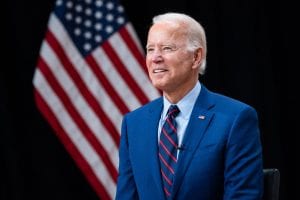
Biden (a former vice president and U.S. senator) became the oldest U.S. president, at age 78.
virus silently stalks the country. It’s taken as many lives in one year as America lost in all of World War II.
“Millions of jobs have been lost. Hundreds of thousands of businesses closed. A cry for racial justice some 400 years in the making moves us. The dream of justice for all will be deferred no longer,” he said. “A cry for survival comes from the planet itself. A cry that can’t be any more desperate or any more clear. And now, a rise in political extremism, white supremacy, domestic terrorism that we must confront and we will defeat.
“To overcome these challenges – to restore the soul and to secure the future of America – requires more than words,” Biden said. “It requires that most elusive of things in a democracy: Unity. Unity.”
In another January in Washington, on New Year’s Day 1863, Abraham Lincoln signed the Emancipation Proclamation.
When he put pen to paper, the 16th President said, “If my name ever goes down into history it will be for this act and my whole soul is in it,” the new president recalled.
“My whole soul is in it. Today, on this January day, my whole soul is in this: Bringing America together,” Biden said. “Uniting our people. And uniting our nation. I ask every American to join me in this cause.
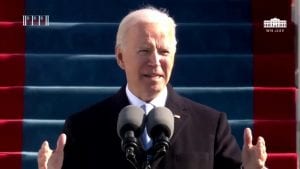
Joe Biden delivering his inaugural address at the U.S. Capitol.
“Uniting to fight the common foes we face: Anger, resentment, hatred. Extremism, lawlessness, violence. Disease, joblessness, hopelessness.”
The only president in history to be impeached twice, Trump claimed upon leaving office: “I am especially proud to be the first president in decades who has started no new wars.”
While that may be technically true (regarding military conflicts in a foreign land), it’s unmistakably true that the real estate developer and former reality TV star fomented a bitter war within America, which Biden referred to as our “uncivil war.”
Trump relentlessly pitted various groups against each other and his second impeachment (with a Senate trial due to start Feb. 8) accused him of inciting insurrection, in the violent mob that stormed the U.S. Capitol Jan. 6. That looked like the definition of a Civil War.
A Jan. 26 New York Times column by a Northwestern professor of Latino studies noted Trump created fear of outsiders even though most of our problems were homegrown, and bent the law to find billions for his wall at the same time that he cut taxes for billionaires and sought to slash federal spending on the arts, education and various safety net programs.
“Indeed, the most durable wall Trump built is the one between Americans, not the one between the United States and Mexico,” the piece said. And of course, Mexico didn’t pay for it, we all are (in more ways than one).
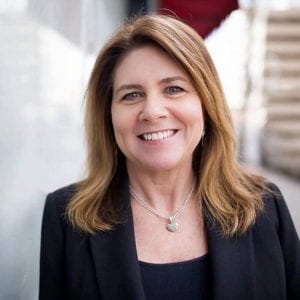
Rene Gellerman is a board member for the Quad Cities Cultural Trust and River Music Experience.
Through the power of music and words on Jan. 20, President Joe Biden showed his commitment to compassion, empathy and again becoming the “United” States of America (after all, our guiding Latin principle is “E Pluribus Unum,” which means “Out of many, one”).
Rene Gellerman, president/CEO of United Way Quad Cities (and board member for River Music Experience and Quad Cities Cultural Trust), was thrilled with the inaugural emphasis on arts and soaring rhetoric – in music and the spoken word.
“I was reminded of the power each of us have in upholding unity. Words matter. Tone matters. Intent matters,” she said. “Each of us are responsible for the kind of world we want to live in. The lessons and spirit of the inaugural ceremony can be applied in our own organizations and community. For example, when the world changed beyond what we would have ever guessed last year, our community responded. We accepted reality, pivoted and aimed to serve our region’s immediate needs.”
“By recognizing where the need is greatest and applying our resources, we can identify and build the interventions that give people the opportunity for economic mobility, quality education and health care — regardless of ZIP code,” Gellerman said, adding that we must heed inaugural poet Amanda Gorman’s uplifting words, “see the light; be the light.”
“Now is the time for the Quad-Cities to prove we’re all in this together,” she said. “Music and art have a way of teaching us things we didn’t even know we were looking to. It inspires hope.”
“I was moved by how much I appreciate and take for granted positivity, the power that we each individually have in creating unity,” she said. “Think about Amanda Gorman and her poem, what she did to inspire people to come together. We all have that power. We don’t utilize it enough — the music, the positive nature of those songs, how we can overcome challenges, see the resiliency of human nature.”
The “Celebrating America” concert – hosted the night of the inauguration by Tom Hanks at the Lincoln Memorial – featured many impassioned, inspirational performances, including by Bruce Springsteen, Foo Fighters, Demi Lovato, Justin Timberlake, John Legend, Jon
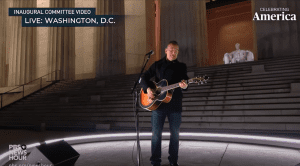
Bruce Springsteen kicked off the “Celebrating America” concert at the Lincoln Memorial.
Bon Jovi, Tim McGraw and Tyler Hubbard, and fittingly concluded by a spectacular, huge fireworks display, accompanying Katy Perry’s exuberant “Firework.”
They all gave us hope that we can make it out of these devastatingly hard times, as McGraw and Hubbard sang, if we’re undivided. Such big problems (like stopping Covid) can only be solved if everyone cooperates.
“United Way has used music to tell the stories of local people who have overcome adversity and show the resiliency of the human spirit,” Gellerman said. “We worked with the RME to recruit songwriters and paired them with individuals who benefited from the work of United Way. These testimonial songs moved hearts and minds and provided better understanding of the struggles too many of our neighbors face.”
“A song can paint a picture in our mind and help us better understand pain or joy, an image can allow us to see things differently about something we didn’t understand, and words — like the ones spoken by Amanda Gorman at the inauguration – can make us feel more love
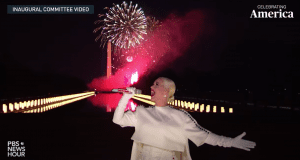
Katy Perry performing the night of Jan. 20, as fireworks explode around the Washington Monument.
and hope about the future,” she said. “Art brings people together. Art and culture matter to people who live here and for companies planting roots here.”
A Black, skinny girl becomes a superstar
Gorman – a blazingly articulate 22-year-old African-American from Los Angeles – is the youngest person to ever deliver a poem at a presidential inauguration. In 2017, she became the first National Youth Poet Laureate and is a Harvard grad.
Ascending to such a prominent gig wasn’t totally out of the blue – on July 4, 2019, Gorman recited her “Believers Hymn of the Republic,” accompanied by the Boston Pops playing the “Battle Hymn of the Republic.”
In her electrifying “The Hill We Climb,” which Gorman wrote for the inaugural, she said:
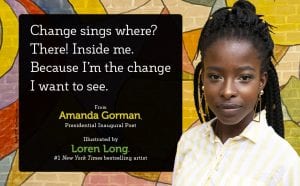
Gorman will write a new poem to be spoken before Super Bowl LV on Feb. 7.
We close the divide because we know, to put our future first,
we must first put our differences aside
We lay down our arms
so we can reach out our arms
to one another
We seek harm to none and harmony for all
Let the globe, if nothing else, say this is true:
That even as we grieved, we grew
That even as we hurt, we hoped
That even as we tired, we tried
That we’ll forever be tied together, victorious
Not because we will never again know defeat
but because we will never again sow division
For the full text, visit HERE.
Ryan Collins, a Q-C poet and executive director of the Midwest Writing Center, said that Gorman was a perfect choice to read at the inauguration.
“As someone who works with young writers, who are often made to feel like their work doesn’t matter, I think it was incredibly important for young writers and artists to see someone like Gorman deliver so well on such a massive stage, and I think it’s validating not just for the work — that poetry matters, but also for all of those who do that work and have a poetry practice, especially young women, especially writers of color,” he said.
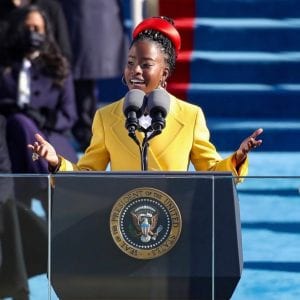
Amanda Gorman, 22, was the youngest poet to deliver a poem at a presidential inauguration, Jan. 20, 2021.
“I saw many poets around my age mention how they were reminded of their earliest encounters with poetry — specifically Maya Angelou reading at the first Clinton inauguration — and how that stayed with them, helped put them on a path,” Collins said. “Seeing so many poets, my peers, who I respect and admire, share that sentiment was assuring that the same thing is happening right now — kids all over the country are seeing a young woman being celebrated for her craft and her performance.
“I am sure the effects of that will reverberate out into our culture in ways that will surely enrich our lives, just as Angelou’s reading did nearly 30 years ago,” he said.
Poetry always matters, and people always turn to it, Collins said, noting a poet won the most recent season of “America’s Got Talent”; a poet is featured in Beyonce’s “Lemonade.”
“The problem isn’t that people don’t notice or care; the problem is they have not been encouraged to see it, sit with, and let their own understanding of it carry them through,” he said. “Gorman’s poem was great in that way — there was so much craft and word play, but also clarity of purpose, context and language, so that it’s a poem accessible to everyone.”
“It was also terrific to hear the music and cadence of her performance, as such performance-oriented work sometimes don’t get enough credit or consideration from older, more traditional (and often whiter) poets, despite its beauty and efficacy,” Collins said.
No problem in human history has been solved without the imagination, and “poetry can help cultivate a healthy one more than any other writing practice I’ve tried,” he added. “And the future Gorman was speaking of, the hope infused in her lines, will not be possible without imagination. So maybe it’s better that we all start reading more poetry, and maybe even try writing some ourselves — because if we don’t, we

Ryan Collins is executive director of the Midwest Writing Center.
don’t have even the hope of making a first step toward a better tomorrow.”
For some reason, poets have only been featured at Democratic inaugurations. The history of inaugural poetry is a relatively short one. Before Gorman, just five poets read poems at U.S. presidential inaugurations, and four of them did within the past 25 years. Here is a complete list of inaugural poets and poems:
- Robert Frost recited “The Gift Outright” (text) at John F. Kennedy’s 1961 inaugural. Frost recited the poem from memory after he was unable to read the text of the poem he’d written for the inauguration, “Dedication” (text), because of the sun’s glare upon the snow-covered ground.
- Maya Angelou read “On the Pulse of Morning” (text; video) at Bill Clinton’s 1993 inaugural.
- Miller Williams read “Of History and Hope” (text; video) at Bill Clinton’s 1997 inaugural.
- Elizabeth Alexander read “Praise Song for the Day” (text; video) at Barack Obama’s 2009 inaugural.
- Richard Blanco read “One Today” (text; video) at Barack Obama’s 2013 inaugural.
Gorman deservedly became a superstar on Jan. 20, and celebrities fell over themselves singing her praises. She included two references from the groundbreaking musical “Hamilton” in the poem, and the following morning, Gorman appeared on Good Morning America to talk about the historic moment and got a surprise video message from “Hamilton” composer/lyricist/star Lin-Manuel Miranda.
“The right words in the right order can change the world, and you proved that yesterday with your brilliant piece,” he said. “I’m so incredibly proud of you and I can’t wait to see what’s next. You smashed it!”
“Her grace and words struck listeners as hopeful at a time when the country faced multiple crises,” the New York Times wrote Jan. 27. “It was
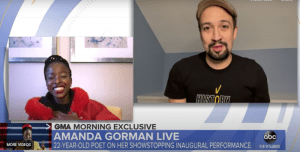
Amanda Gorman got a surprise video message from Lin-Manuel Miranda on Jan. 21.
clear that they were watching a star in the making.”
In the past week, Gorman has had the top three best-selling books on Amazon, including one that won’t be released until September 2021 – “Change Sings: A Children’s Anthem,” a lyrical picture book debut, with New York Times bestselling illustrator Loren Long.
IMG Models announced on Tuesday that it will represent Gorman for fashion and beauty endorsements. On Wednesday morning, “Good Morning America” broke the news that Gorman would be performing at the Super Bowl LV preshow on Feb. 7, the first time in 55 years there has been poetry at the Super Bowl.
“What’s most exciting for me isn’t just the placement of poetry at the forefront of the most watched U.S. television broadcast, but that this poem will honor three heroes who have served their communities during the coronavirus pandemic,” she posted on Instagram.
“I can’t wait for the world to hear the stories of these inspiring people making a difference in trying times. I also wanted to be the first to say that while it’s easy to say that this opportunity must’ve came from my inauguration fame, I’ve actually been talking with the Super Bowl team for weeks now, far prior to the invite to and announcement of my participation in the inauguration,” Gorman said.
“When I was called with the idea of honoring these three amazing change-makers, I was so touched by their altruism,” she said.
Kennedy embodied presidential arts leadership
A president is not only called to moral leadership, representing the best of America, but presidents have often been champions of artists.
Elected when he was just 43, the dashing, witty, wealthy John F. Kennedy ushered in a new spirit of youth, culture and style in the White
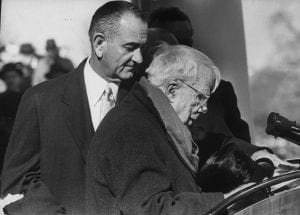
Poet Robert Frost (right) spoke at President Kennedy’s 1961 inauguration.
House upon his 1961 inauguration.
He asked one of his favorite poets, Robert Frost, to read a poem during the inaugural ceremonies. Frost agreed, but the day’s sunlight made reading impossible; instead he recited “The Gift Outright” from memory, receiving thunderous applause upon its conclusion, according to the White House Historical Association.
“By highlighting one of America’s most renowned lyricists, President Kennedy announced to the American people and the world that his interests in literature, poetry, and the arts would not only accompany him to the White House but also shape his cultural policies,” wrote Matthew Costello, vice president of the Rubenstein Center for White House History.
JFK strongly advocated support for American culture and the arts. “While some of this impetus came from within, he also believed these efforts were vital to defeating the Soviet Union,” the piece says. “As both countries contended for economic, military, and ideological superiority, culture became another facet of competition between the two Cold War superpowers.”
While Kennedy was certainly proficient in the arts and considered them valuable to both individuals and nations, First Lady Jacqueline Kennedy brought a greater cultural sophistication to the White House, Costello wrote. “The first lady frequently invited writers, painters, poets, and musicians to perform at various White House events during the Kennedy era. Some of the more famous artists included Leonard Bernstein, Pablo Casals, Igor Stravinsky, and Isaac Stern.”
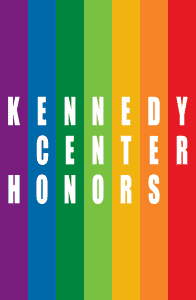
The Kennedy Center Honors have been bestowed since 1977.
Jackie also used the Executive Mansion as a stage to showcase some of America’s leading performing arts organizations such as American Ballet Theater, the Metropolitan Opera Studio, Opera Society of Washington, Interlochen Arts Academy, and American Shakespeare Festival – transforming the White House “into an epicenter for artistic performance and expression.”
JFK – who was assassinated Nov. 22, 1963 – did not live to see the opening of The John F. Kennedy Center for the Performing Arts in Washington, in 1971. Its roots date back to 1958, when President Dwight D. Eisenhower signed bipartisan legislation creating a National Cultural Center.
The National Cultural Center Act included four basic components: it authorized the Center’s construction, spelled out an artistic mandate to present a wide variety of both classical and contemporary performances, specified an educational mission for the Center, and stated that the Center was to be an independent facility, self-sustaining, and privately funded. These same principles still guide the Center’s work today.
JFK took the lead in raising funds for the new center, kicking off a $30-million fundraising campaign in November 1962, holding special White House luncheons and receptions, appointing his wife and Mrs. Eisenhower as honorary co-chairwomen, and in other ways placing the prestige of his office firmly behind the endeavor.
The Kennedy Center has represented a unique public/private partnership. As the nation’s living memorial to President Kennedy, the Center receives federal funding each year to pay for capital repairs and maintenance of the buildings and grounds, a federal facility. However, the Center’s artistic programs, education initiatives, and most administrative functions are paid for almost entirely through ticket sales and gifts from individuals, corporations, and private foundations.
The Center made its public debut Sept. 8, 1971, with a gala opening performance featuring the world premiere of a Mass honoring President
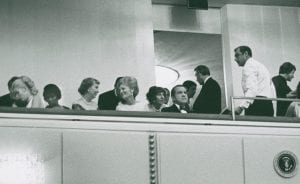
President Richard Nixon at the opening of the Kennedy Center, Sept. 8, 1971.
Kennedy, commissioned from the legendary composer and conductor Leonard Bernstein.
The Republican president, Richard Nixon (who would resign in disgrace three years later), said at the opening:
“America’s performing arts stem from the spirit of the country and the soul of its people, and they impart to the nation’s life a beauty, a grace, and a deep and special communion without which that life would be incomplete. It is especially fitting that they now should have this magnificent new Center in the nation’s capital.”
“Its completion now, as the nation prepares for the approaching celebration of its bicentennial, gives proud emphasis to our rich artistic heritage, and helps ensure that in the third American century that heritage will continue both to grow in vigor and to gain in recognition and support by the public it serves,” Nixon said.
Could you ever imagine Donald Trump ever giving remarks like that?
I don’t recall Trump ever speaking publicly about music and the arts, nor ever hosting artists’ performances in the White House. Despite hailing from perhaps the country’s cultural capital (New York City), he certainly had a fraught, controversial relationship with the Kennedy Center and the arts community overall.
Trump abandoned the arts
Trump never attended the prestigious Kennedy Center Honors (which started in 1977); he consistently proposed eliminating funding for the National Endowments of the Arts and Humanities; and disbanded the President’s Committee on the Arts and Humanities (which was formed in 1982).
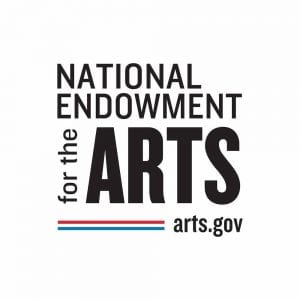
Donald Trump was the first president to propose eliminating the National Endowment for the Arts.
At his 2017 inauguration, 3 Doors Down, Toby Keith, Big & Rich, Jackie Evancho, members of the Rockettes and a handful of others performed.
For comparison, when Barack Obama was sworn in on the same day in 2009, the musical entertainment was provided by Aretha Franklin, Yo-Yo Ma, Itzhak Perlman, Gabriela Montero and Anthony McGill, the U.S. Marine Band and both the San Francisco Boys Chorus and Girls Choruses. During his second inauguration, President Obama brought out Beyoncé, Kelly Clarkson, James Taylor and the Brooklyn Tabernacle Choir,
In his Trump’s first year as president, the White House announced that he and the first lady decided not to participate in events honoring recipients of the 2017 Kennedy Center Honors awards to “allow the honorees to celebrate without any political distraction.”
The December ceremony was held without them and Caroline Kennedy was the host and presented the honorees. The traditional dinner at the State Department on the Saturday evening before the ceremony was hosted by Secretary of State Rex Tillerson and the White House reception was canceled. Donald and Melania Trump also did not attend the 2018 or 2019 events.
“Though the arts have never been neutral politically, the honoring of artists is a bipartisan ritual,” playwright Sarah Ruhl wrote in a December 2017 New York Times column. “The Kennedy Center was a place where the left and the right could agree that the arts occupy a central place in our culture, worthy of our attention and respect. Artists chosen for the Kennedy Center awards generally have fans on the left and the right and everywhere in between. The checkbooks of art patrons are not marked with their party affiliations.
In the ‘80s, Ronald Reagan planned to eliminate the National Endowment for the Arts, and, instead, ended up whittling down its budget by a small percentage. Still, in 1984, before putting medals on Arthur Miller and Lena Horne among other luminaries, he reflected on the way
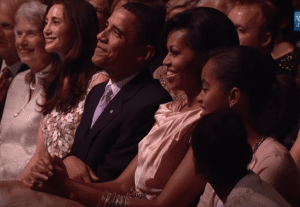
President Barack Obama and First Lady Michelle Obama listen to Paul McCartney in 2010 (Paul’s wife Nancy is at left).
Americans had developed “a culture that was as fertile as this new land” and had continued to innovate in arts and entertainment, Ruhl wrote.
“And today our nation has crowned her greatness with grace, and we gather this evening to honor five artists who have helped her to do so,” Reagan, a former B-movie star, said.
“I never thought I would be quoting Ronald Reagan to make an argument for the centrality of the arts in American life — but his phrase struck me, during the bizarre cultural moment we are living through: ‘Our nation has crowned her greatness with grace,’” Ruhl wrote. “Mr. Trump wants “to make America great again” without dissent and without the arts; but can one truly have greatness without grace?”
When President George W. Bush presided over the Kennedy Center awards for the final time, in 2008, one of the honorees was Barbra Streisand, a vocal critic of his policies. After Bush read her biography, he added, “She’s also been known to speak her mind.”
“The audience laughed, then applauded. Ms. Streisand later wrote: President Bush gave me his signature wink and mouthed, ‘We showed ’em,’ I guess in some small way, he and I proved that we could agree to disagree, and, for that weekend, art transcended politics,” Ruhl wrote. “The wink and the joke were actually profound — they signaled a functional democracy.”
The Trumps (who were never profound and infamously tried to stifle democracy) first skipped the 2017 ceremony after several honorees — most notably leftist television producer Norman Lear — threatened to boycott if he attended.
George H.W. Bush attended the Kennedy Center Honors for most years during his presidency — and even afterward, during his son’s presidency — but like other leaders, he was pulled away by major issues that demanded his time. Bush didn’t attend in 1989 because he was at a summit in Malta. Jimmy Carter missed the 1979 awards because of the Iran hostage crisis. Bill Clinton was on his way to a conference
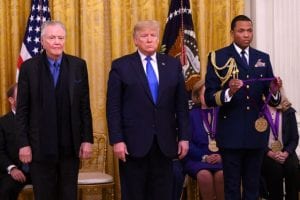
US President Donald Trump awards the National Medal of Arts to actor Jon Voight (L) in the East Room of the White House in Washington, DC, on November 21, 2019. (Photo by Andrew CABALLERO-REYNOLDS / AFP) (Photo by ANDREW CABALLERO-REYNOLDS/AFP via Getty Images)
during the 1994 Kennedy Center awards.
Trump, however, was the first president to miss them at least twice.
For actor Kal Penn, Trump’s rhetoric has been damaging to the arts, according to an NPR piece. Penn was appointed by President Obama to the President’s Committee on the Arts and Humanities, and planned to stay on, but after Trump’s handling of the deadly white supremacist rally in Charlottesville, he and everyone else on the committee resigned.
“The President’s Committee on the Arts and Humanities was then never relaunched under the Trump administration, just to show you that it really wasn’t a priority at all,” Penn said.
Trump did honor some National Medal of Arts winners, but usually in unpublicized White House events. He gave four medals in 2019 – to actor Jon Voight (a staunch and outspoken Trump supporter), as well as singer Alison Krauss, arts supporter Sharon Percy Rockefeller and the musicians of the U.S. military.
This year, Trump reportedly chose two political supporters: Toby Keith, who played at a Make America Great Again celebration at Lincoln Memorial in 2017, and Ricky Skaggs, who voiced support for Trump during the election. On Jan. 13 (the same day as his second impeachment in the House), he also gave the award to Pulitzer Prize-winning photographer Nick Ut; soprano Mary Costa; and former National Gallery of Art director Earl “Rusty” A. Powell III.
Congress created the award in 1984, and it’s considered the highest honor the government can give to artists, arts groups and arts supporters. Nominations are given to an advisory committee of the National Endowment for the Arts, which then submits recommendations to the White House. The president ultimately designates the winners and presents the award.
The medal typically goes to about a dozen people a year, representing a robust cross-section of practices including music, visual arts, filmmaking, acting, theater, dance and philosophy. The honorees typically have enjoyed long and illustrious careers and are universally recognized as leaders in their chosen fields.
Arts advocates have said they were glad to see any artist, or patron of the arts, honored at the White House, even if there were fewer of them and the crowd lacked diversity.
“Every president picks their own list of people, and we are just happy to see the arts be honored,” Robert L. Lynch, president of Americans for the Arts, a national lobbying group, said in 2019. “The medal is not about Trump. The medal is about America, and about our government honoring artists and humanists as something that is important to our country.”
But others have taken issue with how Trump dealt with the arts.
There’s no question that the deficit in empathy and humanity that the president displays would make getting an award from him an awkward predicament,” said Leon Botstein, a conductor and the president of Bard College. “One wants the nation to honor its artists, but on the other hand it’s an embarrassment given the values he stands for.”
Under Obama, a golden age for arts
In Barack Obama’s exceptional, thoughtful, and highly illuminating 2020 memoir, “A Promised Land,” he noted how much he enjoyed hosting artists at the White House.
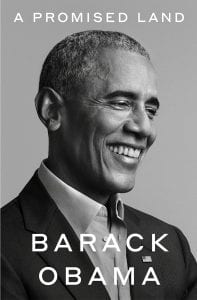
Within a month of its November 2020 release, Barack Obama’s “A Promised Land” sold over 3.3 million copies — well on its way to being the best-selling presidential memoir of modern times.
On page 542, he writes that the best White House perk involved music, reflecting his wife Michelle’s aim to truly welcome people inside “The People’s House” (while the divisive Trump truly put the emphasis on the “White” – in his ugly penchant to coddle and encourage white supremacists).
Michelle Obama’s office scheduled a regular American music series in tandem with PBS, in which some of the country’s leading artists (like Stevie Wonder, J Lo, and Justin Timberlake) – but also up-and-comers like Leon Bridges and living legends like B.B. King – conducted workshops with area students before performing in front of a couple hundred guests in the East Room, or sometimes on the South Lawn.
“Along with the Gershwin Prize concert, which the White House traditionally put on each year to honor a leading composer or performer, the series gave my family front-row seats three or four times a year at a live, star-studded musical extravaganza,” the 44th president wrote.
Obama truly understood their intrinsic, emotional value, even hearing rehearsals. “I’d marvel at everyone’s mastery of their instruments, the generosity they showed toward one another as they blended mind, body, and spirit, and I’d feel a pang of envy at the pure, unambiguous joy of their endeavors, such a contrast to the political path I had chosen,” he wrote.
Obama recalled the “absolutely electric” nature of the concerts, including Bob Dylan, Lin-Manuel Miranda and Paul McCartney. At that latter 2010 concert, where many other musicians did their own versions of Sir Paul songs, McCartney begged forgiveness before serenading the president’s wife with the sweet, lilting “Michelle.”
“She laughed, a little embarrassed, as the rest of the audience applauded, and I wondered what Michelle’s parents would have said back in 1965, the year the song came out, if someone had knocked on the door of their South Side home and told them that someday the Beatle who wrote it would be singing it to their daughter from a White House stage,” Obama wrote.
In 2010, at McCartney’s White House appearance, the president addressed how the arts help us cope with disaster, referring to the massive BP oil spill off the coast of Louisiana.
“We’ve gone through a difficult year and a half, and right now our thoughts and our prayers are with friends in another part of the country
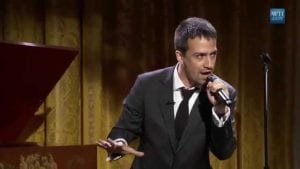
Lin-Manuel Miranda performing at the White House in 2009.
that is so rich in musical heritage — the people of the Gulf Coast who are dealing with something that we simply had not seen before. And it’s heartbreaking. And we reaffirm, I think together, our commitment to see to it that their lives and their communities are made whole again.
“But part of what gets us through tough times is music, the arts, the ability to capture that essential kernel of ourselves, that part of us that sings even when times are hard,” Obama said. “And it’s fitting that the Library has chosen to present this year’s Gershwin Prize for Popular Song to a man whose father played Gershwin compositions for him on the piano; a man who grew up to become the most successful songwriter in history -– Sir Paul McCartney.
In December 2014, at a White House gathering for that year’s Kennedy Center Honors (winners Tom Hanks, Lily Tomlin, Sting, Al Green and Patricia McBride), Obama noted that President Kennedy once wrote: “The life of the arts, far from being an interruption, a distraction, in the life of a nation, is very close to the center of a nation’s purpose — and is a test of the quality of a nation’s civilization.”
Obama said it was “clear that the group on stage with me tonight understands what President Kennedy understood: that our art is a reflection of us not just as people, but as a nation. It binds us together.
“Songs and dance and film express our triumphs and our faults, our strengths, our tenderness in ways that sometimes words simply cannot
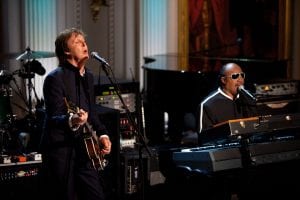
Paul McCartney and Stevie Wonder perform “Ebony and Ivory” at a concert honoring McCartney, recipient of the Gershwin prize, in the East Room of the White House. June 2, 2010. (Official White House Photo by Samantha Appleton)
do,” he said. “And so we honor those who have dedicated their lives to this endeavor. Those who have tapped into something previously unspoken, or unsung, or unexpressed. Those who have shown us not simply who they are, but who we all are. Those who are able to tap into those things we have in common, and not just those things that push us apart.”
Musically speaking, the Obamas were maybe best known as enthusiastic champion of the pop culture phenomenon, “Hamilton,” the Broadway multiple-Tony winner that also earned the Pulitzer Prize, and its creators an unusual team Kennedy Center Honors in 2018.
Miranda famously introduced the opening number of the musical (about the nation’s first Treasury Secretary) in 2009 at the first poetry jam at the White House. Miranda explained how Alexander Hamilton embodied hip-hop — born a penniless orphan, he was a bastard child, rose to become George Washington’s right-hand-man, became Treasury Secretary, “caught beef with every other founding father” and became what he was on the back of his prolific writings, intellectual prowess and towering ego.
Obama – one of the country’s most poetic, eloquent presidents – welcomed the “Hamilton” cast back to the White House for youth workshops and performances in March 2016.
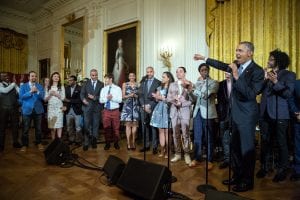
President Barack Obama makes closing remarks following a performance of musical selections from “Hamilton” in the East Room of the White House, March 14, 2016. (Official White House Photo by Pete Souza)
“In the Hamilton that Lin-Manuel and his incredible cast and crew bring to life — a man who is ‘just like his country, young, scrappy, and hungry’ — we recognize the improbable story of America, and the spirit that has sustained our nation for over 240 years,” the president said then.
“In each brilliantly crafted song, we hear the debates that shaped our nation, and we hear the debates that are still shaping our nation. We feel the fierce, youthful energy that animated the men and women of Hamilton’s generation. And with a cast as diverse as America itself, including the outstandingly talented women — the show reminds us that this nation was built by more than just a few great men — and that it is an inheritance that belongs to all of us.”
“And that’s why Michelle and I wanted to bring this performance to the White House. Because ‘Hamilton’ is not just for people who can score a ticket to a pricey Broadway show,” Obama said. “It is a story for all of us, and about all of us.”
“We hope that the remarkable life of Alexander Hamilton will show our young people the possibilities within themselves, and how much they can achieve in the span of a lifetime.
“And we hope that they’ll walk away with an understanding of what our founders got started — that it was just a start. It was just the
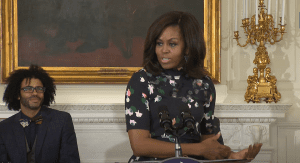
Michelle Obama speaking before the “Hamilton” cast at the White House in 2016.
beginning. That’s what makes America so great. You finish the story. We’re not yet finished. This is a constant work in progress, America.”
(In Gorman’s “The Hill We Climb,” she said: “Somehow, we’ve weathered and witnessed/A nation that isn’t broken, but simply unfinished.”)
At the 2016 White House event, Michelle Obama said of “Hamilton”: “I have been waiting for this day for a long, long time…We wanted to change things up at the White House. We wanted to open the doors really wide, for a bunch of different folks who usually don’t get access to this place. We also wanted to highlight all different kinds of American art, in all the art forms.”
“We started with spoken word, because no one had ever held a poetry slam in the White House,” she said. Michelle recalled Miranda’s ’09 performance; had some doubts about making a hip-hop musical about a Founding Father, and could not have predicted he would write “a work of genius.”
“It was simply the best piece of art, in any form, that I had ever seen in my life,” she said, noting she first saw “Hamilton” off-Broadway in 2015. Could you ever imagine Melania saying such a thing? (I don’t recall her ever speaking out for the arts.)
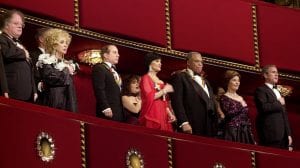
Honorees (from left) James Levine, Elizabeth Taylor, Paul Simon, Chita Rivera and James Earl Jones stand beside first lady Laura Bush and President George W. Bush during the 25th Kennedy Center Honors in 2002. Rivera was the last Hispanic recipient of the award.
In January 2017, with Obama’s days in office dwindling, “Hamilton” released a special video from that White House performance — Christopher Jackson (as George Washington) and Miranda performing “One Last Time,” which chronicles Washington’s decision to step down as president.
Throughout the performance, the camera frequently cuts to the president, vice president, and first lady in the audience, and as Jackson holds the final note, Obama can be seen mouthing “whoa” and leading the audience in a standing ovation.
“What an incredible gift these folks have given to the United States of America,” the president told the audience afterward. “It is rare where a piece of art can remind us about what’s best in ourselves, and that’s what these guys have done, and that is a great gift.”
Recalling the 2009 Kennedy Center and Obama
For Patrick Downing of Davenport, Biden’s inauguration was special, as it not only offered much needed national hope and healing, but

Patrick Downing of Davenport at the 2009 inauguration.
brought back his memories of working in Washington, D.C. for five months in 2009, before graduating from Western Illinois University.
Downing – a pianist, actor, and choir member at First Presbyterian Church – was among 25 interns at the Kennedy Center, working in the
press office from January to May.
“For me, it evoked a lot of emotion,” he said recently of watching Biden’s inaugural. Just weeks after he started working for the Kennedy Center, a group of friends from the office decided to join the 1.8 million on the National Mall for Obama’s first inauguration.
He recalled getting up at 5 a.m. and putting on four or five layers to stand in the freezing cold for hours, but Downing was ecstatic to witness history.
He and other interns got to tour the White House in April 2009, and they saw Marine One land in the South Lawn, excited to catch a glimpse of the president.
“We saw President Obama walking out of the Oval Office,” Downing said, noting there was a group of 1st or 2nd grade students coming on the tour also, and a little girl shouted at the top of her lungs, “Good morning, Mr. President!” he said, and Obama waved and responded to her.
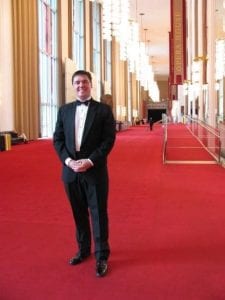
Downing, who was a Kennedy Center intern, at a spring gala in 2009.
“She cried that the president said hi to her,” Downing recalled.
Though he didn’t get to attend the Kennedy Center Honors, Downing did get to go to that year’s spring gala (featuring Lily Tomlin and LeAnn Rimes), where Michelle Obama and Jill Biden sat in the president’s box.
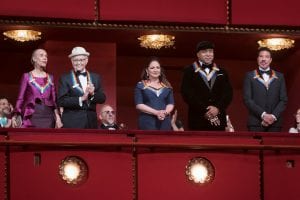
The 2017 Kennedy Center honorees were Carmen de Lavallade (left), Norman Lear, Gloria Estefan, LL Cool J and Lionel Richie.
Downing also was disappointed that Trump skipped the Kennedy Center Honors.
“That was such a break with tradition,” he said. “I think having the leader of our country recognizing how important the arts are in America is a huge statement. The Kennedy Center has been there since 1971. The fact that every president is part of the formal celebration. Not all celebrities got along with President Trump, but it was disheartening to see that disconnect.”
Especially during this prolonged, isolating pandemic (when most people can’t attend shows or concerts), music plays such a vital role in our lives, Downing said.
“I do think when this all clears up, especially if you’ve been in a show or people who attend shows, there will be an unbelievably large appreciation for it,” he said. “I don’t think any of us will take it for granted again…It’s truly what we need right now, that pull of unity.”
Downing has recorded about a dozen piano videos that he’s posted on Facebook since the pandemic, and on Jan. 20, he played the John Williams piece, “With Malice Toward None” from the 2012 film, “Lincoln.”
“There is so much I could write about the myriad of emotions I felt on this historic day for the country we all love. However, as author Hans
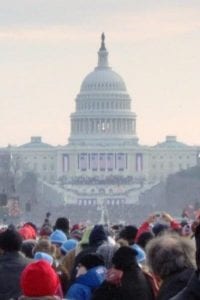
1.8 million people attended the 2009 inauguration of President Obama.
Christian Andersen said, ‘Where words fail, music speaks’,” Downing wrote.
That piece was inspired by the line in Lincoln’s famous second inaugural address on March 4, 1865, during the final days of the Civil War and only a month before he was assassinated. In his second inaugural, Lincoln discussed the war and slavery, and ends with these words of reconciliation:
“With malice toward none; with charity for all; with firmness in the right, as God gives us to see the right, let us strive on to finish the work we are in; to bind up the nation’s wounds; to care for him who shall have borne the battle, and for his widow, and his orphan—to do all which may achieve and cherish a just, and a lasting peace, among ourselves, and with all nations.”
Trump (who often unrealistically compared himself to Lincoln) seemed to represent “with malice toward all,” and Downing said that was unhealthy for the nation.
“I don’t know anyone who says, ‘I love how divided the country is right now’,” he said. “Nobody wanted this.”
How federal arts funding has changed
Donald Trump became the first president to propose eliminating the National Endowment for the Arts, the culmination of prior conservative calls to close the federal arts-funding agency.
But the nightmare they feared never came to pass, the New York Times wrote Jan. 15. The agency survived, its budget even grew a bit, not because President Trump ever wavered in his view of it as a waste of federal dollars, but because Congress voted to keep it alive. NEA funding grew from $148 million in 2016 to $162 million in 2020, and the National Endowment for the Humanities from $123 million to $167 million over four years.
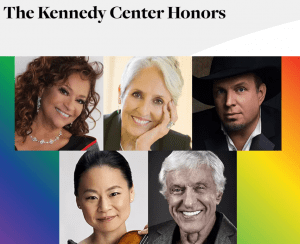
The 2021 Kennedy Center honorees are (clockwise from upper left) Debbie Allen, Joan Baez, Garth Brooks, Dick Van Dyke and Midori.
(Fun fact – the U.S. Capitol Police budget alone is $460 million, averaging $200,000 per officer employed. How did that budget work out Jan. 6? Five people were killed, 140 officers were injured, and two Capitol Police took their own lives afterward.)
In 2020, Trump proposed a Department of Defense budget of $705 billion.
Part of the argument against shuttering the arts endowment has always rested on the fact that culture is an economic engine and that, as federal agencies go, the NEA is hardly an expensive one, the Times wrote. Its $167.5 million budget for 2021 is still no more than what one city, New York, spends on its cultural affairs.
The number has grown by about $17 million since 2017, but it’s still absolutely dwarfed by the cultural budgets in European countries where financial support for the arts is viewed as a government function. For example, Britain’s culture ministry has annually spent more than $1 billion on the arts for years.
Created in 1965 when President Lyndon B. Johnson signed legislation declaring that the arts and humanities belong to all people, the NEA was founded on the belief that the arts have a role in the spiritual and economic health of the nation, and deserve government underpinning.
Its individual grants are relatively small in a cultural industry that predominantly relies, not on government support, but ticketing and private donations for funding. Nevertheless, defenders of the agency see the federal government’s role in backing the arts, in awarding coveted honors and issuing grants, as sustaining, and smaller organizations, whose ability to tap major donors for help is limited, often view financial help of any size as essential.
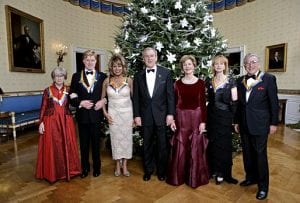
President George W. Bush, First Lady Laura Bush and the 2005 Kennedy Center honorees.
Nolen Bivens, interim president/CEO of Americans for the Arts and the Americans for the Arts Action Fund, released the following statement in response to final passage of the year-end bill that combines $900 billion in Covid-19 economic relief with $1.4 trillion omnibus spending bill for fiscal year 2021:
“We are pleased that Congress has approved both a second pandemic relief bill and the annual appropriations bill, providing much-needed support to the creative economy workforce and to the many nonprofit arts organizations and institutions that have been shuttered for 10 months.
“Advocacy for the disproportionately affected arts sector is broad, ranging from The U.S. Conference of Mayors and the National Association of Chamber Executives, to coalitions of artists and arts organizations such as the Cultural Advocacy Group, Be An Arts Hero, Save Our Stages—and we are thankful for all their contributions to the effort. This important cultural support from Congress is a testament that the arts have bipartisan support in the country.”
Kal Penn told NPR he wants to see the Biden administration give the National Endowments an “astronomical increase.”
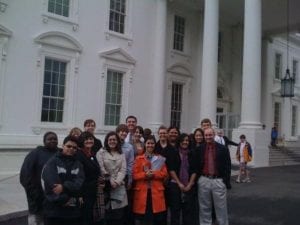
A group of Kennedy Center interns outside the White House in April 2009.
“I think it’s important now more than ever to be bold,” he says, noting that the arts benefit education, innovation, mental and emotional health. Plus, he says, it’s a good investment.
“When you say, ok, well, why did you spend all this money to save this theater — yes, you’re saving the theater, and maybe you’re saving the 500 jobs that the theater provides for the local community, but you’re also then saving the restaurants that people go to the night of the show,” he says. “You’re saving the hotels that the visiting artists stay at.”
The Bureau of Economic Analysis and the NEA released a report that said the arts contributed 4.5 percent to the country’s GDP (or $878 billion) in 2017. That’s more than agriculture and transportation. Arts advocate Charles Segars, head of the Ovation TV network, says it’s time for the arts to be taken just as seriously by the White House, by creating a cabinet level Secretary of Arts and Culture.
“It centralizes, in the positive sense of the word, all of the leverage of the United States government. Remember, you have arts pockets throughout the Department of State, Department of Defense. Even Transportation and Agriculture has a taste of that, of arts programs that they help support.”
A Jan. 13 New York Times piece (“The Arts Are in Crisis. Here’s How Biden Can Help”) notes that compared with Canada, Australia and most of Europe, the U.S. has few cultural institutions funded through federal appropriations. The memorials on the National Mall are erected
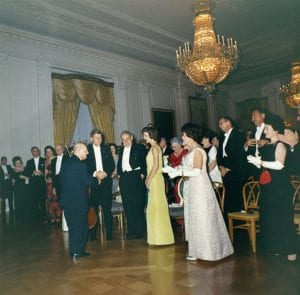
President John F. Kennedy and First Lady Jacqueline Kennedy with cellist Pablo Casals in the White House in November 1961.
almost entirely with private cash; the Kennedy Center earns most of its income from donations and ticket sales.
Even the Smithsonian Institution is a public-private partnership; its most recent Congressional disbursement of $1 billion a year accounts for 62 percent of its annual budget. At the Venice Biennale, where nations mount exhibitions in a kind of Olympics of contemporary art, the United States is one of the few participants whose government doesn’t pay for the show.
Now some emboldened liberals have been dreaming, as they did when Barack Obama took office, that Biden might establish a cabinet-level Department of Culture — the first new department since George W. Bush established the Department of Homeland Security in 2002. Such a department might absorb the NEA, NEH, and Institute of Museum and Library Services (all independent federal agencies), the Corporation for Public Broadcasting (a nonprofit), as well as parts of the State, Interior, and Education Departments.
“Artsy Americans have long been jealous of Europe’s government-funded theaters and opera houses — and as cultural institutions have shed jobs over the last year, it’s easy to envy public institutions abroad,” the Times piece said.
“Our own museums, symphonies and ballet companies are financed principally through philanthropy, while our film, television and music industries are driven by the profit motive. There is, in consequence, hardly a large enough federal culture budget to merit a department. And as I don’t see a strong argument to nationalize the Metropolitan Museum of Art or Carnegie Hall, a federal culture department risks, at least right now, being more bureaucratic than beneficial.”
Jason Farago wisely wrote of the centrality of arts to the life of our nation – putting our “whole soul in it.”

“I’ve always been wary of arguments about art’s ‘necessity.’ But a soul-sick nation is not likely to recover if it loses fundamental parts of its humanity. Without actors and dancers and musicians and artists, a society will indeed have lost something necessary — for these citizens, these workers, are the technicians of a social catharsis that cannot come soon enough. A respiratory virus and an insurrection have, in their own ways, taken the country’s breath away. Artists, if they are still with us in the years ahead, can teach us to exhale.”
When is the next Kennedy Center Honors?
After just 10 days in office, President Biden’s call for unity has predictably been ignored by most Republicans in Congress, but we can all look forward to the return of the Kennedy Center Honors for 2021.
The last recipients in 2019 were Earth, Wind & Fire, Sally Field, Linda Ronstadt, Sesame Street, and Michael Tilson Thomas.
The 43rd Kennedy Center Honors for lifetime artistic achievements, traditionally is held in early December each year, was postponed until May 2021 due to the Covid-19 pandemic. Recipients to be honored at the annual national celebration of the arts are: multi-disciplinary artist, choreographer, and actress Debbie Allen; singer-songwriter and activist Joan Baez; country singer-songwriter Garth Brooks; violinist Midori; and actor Dick Van Dyke.
Reflective of this unique time in history, the Kennedy Center campus will come alive with small, in-person events and re-envisioned virtual tributes. Featuring multiple events for physically-distant audiences in locations across the Kennedy Center’s campus including the Front Plaza of the building, the Grand Foyer in front of the John F. Kennedy bust, and the iconic Opera House stage, programs for each event will encompass both performances and speaking tributes for the honorees.
Virtual events will also be held throughout the week beginning May 17, and the viability of additional in-person events will be considered as Covid safety protocols evolve over the upcoming months.
A medallion ceremony for the honorees and a limited audience will be hosted by the Kennedy Center during the week of May 17–22. A CBS TV special will air on June 6. For more information, visit www.kennedy-center.org/whats-on/honors/.



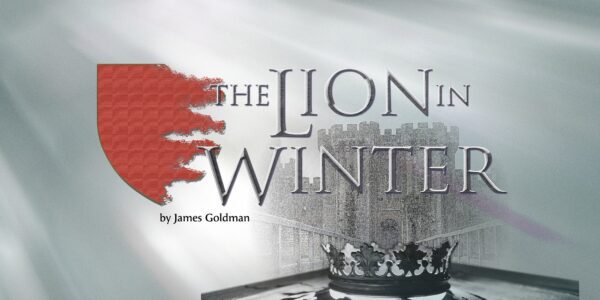
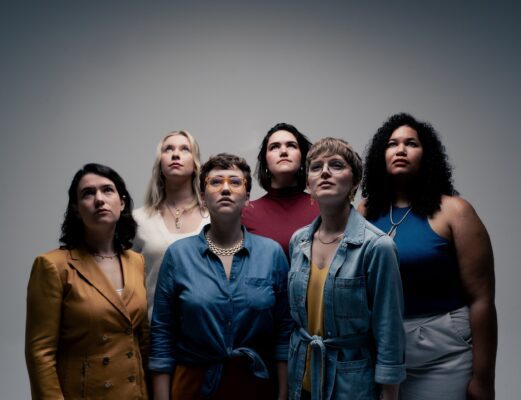








Leave a Reply
You must be logged in to post a comment.